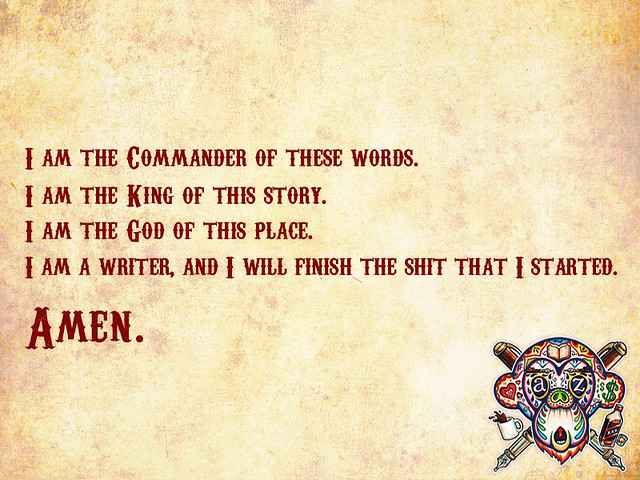A big and very gracious thank-you to the SFRB for letting me guest-post once again today. Today's post has been inspired by a bugbear I've been dealing with lately: continuity.
Those of you who are fans and bloggers might shrug when I mention continuity. Writers, on the other hand, are probably feeling a shiver down their spines that has nothing to do with the ice-bucket challenge. To explain why this induces muttering dreams and sleepless nights, it wouldn't hurt to have a definition.
 |
Source. Pictured: a reader unhappy with continuity errors. |
Continuity: what is it, and why does it matter?
"Continuity" refers to self-consistency through descriptions, action, storylines, and development in a creative work. In a nutshell, good continuity means adhering to your own rules. A work should be congruent and not vary too much throughout its existence. "Discontinuity" happens when errors are made or the lore is changed; "retroactive continuity", or "retcons", are made to reconcile early errors with later events, details, or changes. You can also manipulate continuity in order to make the narrator unreliable. Inception, American Psycho, Memento, and other films and books have made use of this. An unreliable narrator is great when it's done on purpose, but inconsistent details can also make a writer look sloppy.
For instance, your distraught loner character might develop into a compassionate and friendly, even optimistic person through a series, but she probably shouldn't too perky and resilient right away if she's recently lost her entire family, dog, boyfriend, and ship in a single fell swoop. This usually happens when a series has been left alone for too long and the author's forgotten how to write for a character, or when the author is getting bored of a character's traits.
Character continuity is important, and the same goes for plot details. Something that one character says happened two years ago should not suddenly have happened ten years ago when it's mentioned again. We'll go deeper in a second.
Why is this important for sci fi?
Everyone knows about the fan outcry that happened when George Lucas created the first Star Wars movies, but retroactive continuity issues also played a role in the first trilogy. Entire blogs have been written and based on examining errors in the series, so let's talk about a different example--Doctor Who. With so many writers, the story of the Time War has been bent and twisted and changed in ways that can seem self-contradictory. This also affects the characters and their journey, of course, because the plot never functions in isolation. (If it does, get an editor to look over your book, stat, because something is broken.)
As writers of fiction, it's important to learn from failures and make sure that our worlds are consistent. A tiny detail that was mentioned and thrown away earlier can be mined for plot purposes later, or, conversely, can break the plot. Farscape had a wonderful episode called "The Locket", but the mechanism their ship Moya used to escape a time-freezing zone, a "reverse starburst", unfortunately was never mentioned again. The eagles in The Lord of the Rings or the many, many plot devices used in the Harry Potter series are examples of dropped plot devices and throwaway details that accumulated to create some improbable and silly situations for the characters. The worst case I've seen was probably in The Sword of Truth--there were so many throwaway plot devices in this series that the author had to go nuclear on the ending for the last book in order to reconcile them all.
When plot devices are forgotten or tossed aside from continuity, characters' situations can end seem silly to the audience. Just because the author has forgotten something doesn't mean our readers will, unfortunately!
 |
Source. |
How do we fix it?
It wouldn't be a SciFiMagpie post without a solution. In this case, it's simple, but a lot of work: KNOW THY WORLD. Chuck Wendig has a particularly wonderful affirmation card (posted above). The way I'm coping with continuity in The Meaning Wars is by re-reading And the Stars Will Sing and The Stolen: Two Short Stories. Unfortunately, it's also brought a few flaws and typos in the books to my attention, but that's part of the process. You can't be a better writer unless you know your flaws.
"How can I smooth over that exposition? How can I change things so I can avoid that head-jump--can I imply things, perhaps? Maybe do a short scene from the other character's perspective? Did I just change the location of this world by accident? How can a luxurious Southern California/Ireland-like region exist in a warzone? Should I move it?" These are just a few of the questions I've been asking myself, and while painful, it's also really satisfying to know when I've gotten something right. After all, readers love to niggle, but even the ones who miss continuity errors appreciate smooth, consistent stories. This is also the reason why editors are very, very useful people to know.
And the better you do at maintaining continuity, the less sleep you'll lose at night after you accidentally change a character's name, make them three inches taller than they were in the first book, and give them a peanut allergy that would have killed them in the first scene in the second book.
*****
Thanks for dropping by the nest once again. Don't miss any of the phuquerie. Find Michelle on Twitter, Facebook, and on Tumblr, and find her work on Amazon. Check back on the blog to see when one of the irregular posts has careened onto your feed. This is the one and only SciFiMagpie, over and out!

.jpg/800px-Hippie_bug!_(1043753793).jpg)



